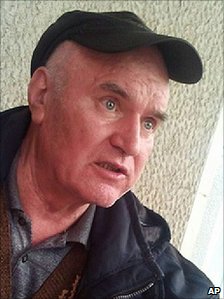 Serbia's war crimes court is considering Ratko Mladic's appeal against his transfer to the UN tribunal in The Hague to face genocide charges.
Serbia's war crimes court is considering Ratko Mladic's appeal against his transfer to the UN tribunal in The Hague to face genocide charges.
The Belgrade court received the appeal papers on Tuesday morning after they were posted by Gen Mladic's lawyer Milos Saljic on Monday.
Milos Saljic argues the former Bosnian Serb military commander is too ill to face trial and needs medical attention.
The ministry of justice has three days to decide on the appeal.
The appeal is expected to fail, as doctors who examined Gen Mladic on Friday said he was fit enough to be extradited.
He was seized last Thursday in Lazarevo village, north of Belgrade, having been on the run for 16 years.
Gen Mladic is accused of committing war crimes during the Bosnian war, including the 1995 Srebrenica massacre of 7,500 Muslim men and boys.
Earlier on Tuesday he was allowed to visit the grave of his daughter Ana - who committed suicide in 1994 - albeit with a police escort.
Delaying tactic?
Despite a decision by a Belgrade court that Gen Mladic was fit enough to be handed over to the UN court, Mr Saljic said he would request another independent medical examination, saying his client's health had deteriorated since his arrest.
"I don't think the trial will take place. He will not live to the start of the trial," said Mr Saljic.
The BBC's Mark Lowen in Belgrade says the appeal is likely to be rejected - possibly later on Tuesday.
Serbia's deputy war crimes prosecutor has already dismissed the claim of ill-health as a delaying tactic.
"As far as his mental state is concerned, believe me, he looks more normal than many others," said the prosecutor, Bruno Vekaric.
He also dismissed as ungrounded media reports that Gen Mladic had hearing difficulties and that his right arm was paralysed - possibly as a result of a stroke.
The government will hope Gen Mladic's departure will quell any further demonstrations by his supporters, adds our correspondent.
The Hague tribunal says it will not specify on which day Gen Mladic will arrive, but our correspondent says there is speculation he could be sent on a night-time flight, without prior warning.
BACK1 of 7NEXT
Gen Mladic's arrest is considered crucial to Serbia's bid to join the European Union.
Darko Mladic has said his father had told him he was not responsible for the killings in Srebrenica, committed after his troops overran the town.
Following the arrest of Radovan Karadzic in 2008, Gen Mladic became the most prominent Bosnian war crimes suspect still at large.
He was indicted by the UN war crimes tribunal in The Hague in 1995 for genocide over the killings that July at Srebrenica - the worst single atrocity in Europe since World War II - and other alleged crimes.
Having lived freely in the Serbian capital, Belgrade, he disappeared after the arrest of former Yugoslav President Slobodan Milosevic in 2001.
On Sunday, thousands of people rallied in Belgrade against his arrest, hailing the general as a Serbian national hero and decrying the pro-Western government of President Boris Tadic for arresting him.



